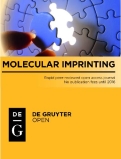|
|
Reference type: Conference Proceeding
Authors: Saito K, Oyama T, Tomoi M
Publication date: 2002
Article title: Less crosslinked molecularly imprinted polymer catalyst prepared from N-acryloylamino acid derivatives.
Page numbers: 1721
Alternative URL: http://www.jstage.jst.go.jp/article/spsjppj/51m/0/51m_1721/_article
Proceedings title: Polymer Preprints, Japan
Volume number: 51m
Abstract: Molecular imprinting technique has been developed in the design of new polymer catalysts. Recently, it is predicted that artificial (non-crosslinked) imprinted polymer which recognize specific molecules just as enzyme can be prepared by introducing various interactions into the polymer. Thus, in this paper, we report synthesis of less crosslinked molecularly imprinted polymer catalyst by using monomers containing peptide structure at side chain. Transition state analogue (TSA) for hydrolysis of p-nitrophenyl acetate was prepared by the reaction of p-nitrophenol with methylphosphonic dichloride. The novel functional monomers (N-acryloylpeptide derivatives) were synthesized from the amino acid (Ser, Gly, His and Phe) derivatives and acryloyl chloride. The design of monomers was inspired by the active site structure of the enzyme, a-chymotrypsin. The imprinted polymer was prepared by radical polymerization of the functional monomers with small amount of cross-linker in the presence of TSA in DMSO for 1h at room temperature. Catalytic activity of the obtained polymer for the hydrolysis of p-nitrophenyl acetate was examined.
|


 Good morning caffeine mug
Good morning caffeine mug







 SMI logo impulse tote bag
SMI logo impulse tote bag







 SMI mug grey
SMI mug grey






